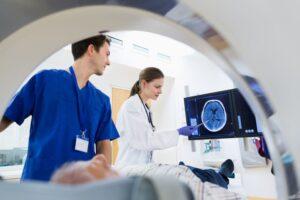The Role of Biomarkers in Stroke Diagnostics

Stroke remains a major health challenge, with early and accurate diagnosis being crucial for effective intervention. While imaging techniques are well-established, the role of biomarkers in stroke diagnostics is becoming increasingly prominent. Biomarkers offer a complementary approach to traditional imaging, providing additional information that can enhance diagnostic accuracy and guide treatment decisions.
Understanding Biomarkers
Biomarkers are measurable indicators of biological processes or conditions. In the context of Stroke Diagnostics , biomarkers are substances found in blood, cerebrospinal fluid, or tissues that can provide insights into the presence and severity of stroke. They can help differentiate between stroke types, assess brain injury, and monitor disease progression.
Types of Stroke Biomarkers
1. Neuroimaging Biomarkers: Certain proteins and enzymes are released into the bloodstream following brain injury. For example:
- S100B Protein: This protein is released from glial cells and is associated with brain injury. Elevated levels of S100B can indicate neuronal damage and help assess the severity of stroke.
- Neuron-Specific Enolase (NSE): NSE is an enzyme found in neurons, and elevated levels in the blood can reflect neuronal injury.
2. Inflammatory Markers: Stroke often triggers an inflammatory response, and several inflammatory markers can be measured:
- C-Reactive Protein (CRP): Elevated levels of CRP can indicate inflammation and are associated with worse outcomes in stroke patients.
- Interleukins: Specific interleukins, such as IL-6, are involved in the inflammatory response and can provide information about the inflammatory status of the patient.
3. Coagulation Markers: Since stroke can result from blood clot formation, markers related to coagulation are relevant:
- D-Dimer: Elevated levels of D-dimer, a breakdown product of fibrin, can indicate ongoing clot formation and degradation, which is relevant in assessing stroke risk and progression.
Applications in Stroke Diagnosis
1. Early Detection: Biomarkers can provide valuable information in the early stages of stroke, potentially before imaging changes are detectable. For example, elevated levels of S100B protein can signal brain injury shortly after stroke onset, aiding in early diagnosis.
2. Differentiation of Stroke Types: Biomarkers can help differentiate between ischemic and hemorrhagic strokes, which is crucial for selecting appropriate treatment. For instance, while imaging is the primary method for this differentiation, biomarkers like NSE can support the diagnosis by indicating neuronal damage.
3. Risk Assessment and Prognosis: Biomarkers can be used to assess stroke risk and predict outcomes. For example, high levels of inflammatory markers are associated with a worse prognosis and can help guide therapeutic strategies.
4. Monitoring Treatment Response: Biomarkers can be used to monitor the effectiveness of treatments, such as thrombolysis or anticoagulation therapy. Changes in biomarker levels can provide real-time feedback on the response to therapy and guide adjustments in treatment.
Challenges and Future Directions
While biomarkers hold great promise, several challenges need to be addressed:
- Validation and Standardization: For biomarkers to be used clinically, they must be validated through extensive research and standardized across different laboratories. This ensures reliability and consistency in results.
- Cost and Accessibility: Some biomarker tests can be expensive and may not be readily available in all healthcare settings. Efforts are needed to make these tests more accessible and affordable.
- Integration with Existing Diagnostics: Biomarkers should complement, rather than replace, existing imaging techniques. Integrating biomarker testing into routine clinical practice requires careful consideration of how these tests fit into the overall diagnostic and treatment workflow.
Future Prospects
Ongoing research is focused on identifying new biomarkers and improving existing ones. Advances in genomics and proteomics are likely to uncover novel biomarkers with greater sensitivity and specificity. Additionally, the development of point-of-care tests that can provide rapid results will enhance the utility of biomarkers in acute stroke settings.
biomarkers are becoming an increasingly important component of stroke diagnostics. They offer valuable information that complements imaging studies, aids in early detection, and helps guide treatment decisions. As research progresses, the integration of biomarkers into clinical practice has the potential to improve stroke diagnosis and patient outcomes significantly.
Get More Insights On stroke diagnostics
Discover the Report for More Insights, Tailored to Your Language.
About Author:
Ravina Pandya, Content Writer, has a strong foothold in the market research industry. She specializes in writing well-researched articles from different industries, including food and beverages, information and technology, healthcare, chemical and materials, etc. (https://www.linkedin.com/in/ravina-pandya-1a3984191)
- Art
- Causes
- Crafts
- Dance
- Drinks
- Film
- Fitness
- Food
- Jeux
- Gardening
- Health
- Domicile
- Literature
- Music
- Networking
- Autre
- Party
- Religion
- Shopping
- Sports
- Theater
- Wellness


